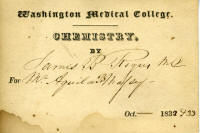JAMES B. ROGERS, M.D.

Click image to enlarge
Go to lecture card display
James B. Rogers, late Professor
of Chemistry in the medical department of the University of
Pennsylvania, was born in the city of Philadelphia, on the 22d of
February, A.D. 1803.
He was the eldest son of Dr.
Patrick Kerr Rogers, who, at an early age, emigrated to this country
in 1791. Soon after his arrival, the youthful emigrant was employed
as an usher, in the literary department of the University of
Pennsylvania; but his inclinations directed him towards the medical
profession; and, having pursued his studies in the office of
Professor Barton, he graduated, as Doctor of Medicine, in 1802. The
thesis which he presented was an experimental one, of the chemical
and medicinal properties of the Liriodendron tulipifera. In 1819 he
was appointed Professor of Natural Philosophy and Chemistry, in
William and Mary College, at Williamsburg, Virginia.
The subject of our notice, after
having concluded his preliminary education at William and Mary
College, entered upon the systematic study of Medicine. His studies
were conducted in Baltimore ; and, enrolling himself as a pupil of
the University of Maryland, whose reputation at the time was
maintained and extended by the names of Potter, Davidge, Baker, and
De Butts, in 1822 he received the honors of the institution. His
thesis was upon Epilepsy.
In 1840 he took up his abode in
Philadelphia, his native city, which continued to be his home until
his decease.
After removing to Philadelphia,
he was first occupied in rendering that assistance to his brother,
Henry D. Rogers, the geologist of the State of Pennsylvania, which
he had done in Virginia, and was engaged in the field as well as in
the laboratory. His leisure seasons were employed in giving private
instruction to medical students in the form of recapitulatory
lectures and examinations. In 1841, the changes which occurred in
the Philadelphia Medical Institute opened the way for the more
prominent exhibition of his powers as a lecturer in this community.
He was chosen to succeed Professor J. K. Mitchell, who for many
years had been distinguished for his interesting and attractive mode
of teaching chemistry. In this position, expectation was not
disappointed, and henceforth Dr. Rogers was regarded as worthy the
highest position pertaining to his branch.
In 1847, while connected with the
Franklin College, a new and promising institution to which he had
contributed strength, the chair of Chemistry in the University of
Pennsylvania became vacant by the resignation of Professor Hare, and
he became the successor of the same eminent individual to whom his
father had succeeded twenty-eight years previously.
But the wear of life was making
inroads on his constitution; and with a full conviction of his
condition, with Christian hope, he yielded up his spirit without a
struggle, on June 15th, 1852.
|
|